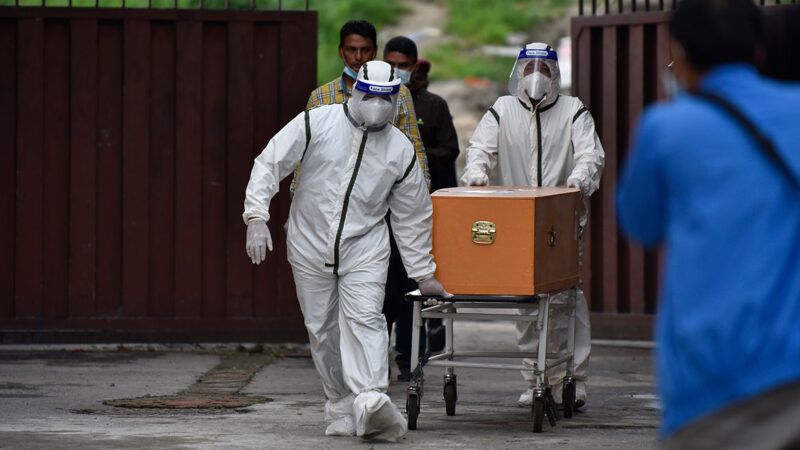Blame Qatar's Illiberal Migrant Labor Laws for Its Mounting World Cup Death Toll
Thousands of people from Bangladesh, India, Nepal, Pakistan, and Sri Lanka have died while working on enormous infrastructure projects in the lead-up to the 2022 FIFA World Cup.

Qatar's bid to boost its global standing by hosting the 2022 FIFA World Cup is hardly unprecedented. Adolf Hitler hoped the 1936 Olympics would demonstrate the merits of his terrible ideals (Jesse Owens had other plans), while modern authoritarians in China and Russia use sports to bolster their nationalist credos. Even democratic leaders vie to host prestigious sporting events in the usually vain hope of boosting economic growth and raising tourism baselines long after the final whistle.
"Sportswashing" of this kind often serves to distract people from bad government behavior in other arenas. But in Qatar's case, it was the government's eagerness to host the World Cup that fostered deadly abuses.
Since FIFA awarded Qatar the hosting rights in December 2010, more than 6,500 migrant workers are known to have died in Qatar, according to a February 2021 Guardian report. That combined number came from the governments of Bangladesh, India, Nepal, Pakistan, and Sri Lanka. The true total may be much higher, since large numbers of Kenyans and Filipinos also are working in Qatar.
Most of these workers died while building the vast infrastructure the country needed to host the roughly 1.5 million foreign fans who are expected to attend the World Cup in November and December. In 2015, when the migrant worker death toll was at least 1,200, the BBC reported that workers were building "subways, hotels, and even an entire city…not to mention an airport, numerous roads, a new sewerage system in central Doha and 20 skyscrapers."
Qatar's insufficient infrastructure raised major concerns when it won the right to host over countries that already had adequate transportation and sports facilities, including Australia, Japan, South Korea, and the United States. In 2018, the United States won the right to host the 2026 World Cup in a joint bid with Canada and Mexico.
According to that 2021 Guardian report, the World Cup's organizing committee said 37 people have died while working on the eight World Cup stadiums. According to data compiled by The Washington Post in 2015, the known death toll during stadium construction was six for the 2008 Summer Olympics in Beijing, 10 for the 2014 World Cup in Brazil, and two for the 2010 World Cup in South Africa. Sixty people reportedly died while working on facilities for the 2014 Winter Olympics in Russia.
Qatar's organizing committee claims 34 of those 37 deaths were not work-related. But Qatari authorities frequently exclude the deaths of otherwise healthy young workers who collapse on the job in Qatar's intense heat. Consider, for example, Sujan Miah, a Bangladeshi "pipe fitter on a project in the desert" who, according to Amnesty International, was found dead in his bed after four days of temperatures above 104 degrees Fahrenheit.
While workers should be free to take on dangerous jobs, it is difficult for Qatar's migrant workers to leave if they find conditions unbearable due to strict laws around labor mobility. Many pay hundreds or thousands of dollars in fees to recruitment agents just to get their jobs and never manage to pay off their debts after years of work.
Mohammad Shahid Miah, for example, paid more than $4,000 in recruitment fees to land a construction job in Qatar in 2017. In September 2020, he died of electrocution when rainwater came into contact with exposed wires in his worker housing. According to The Guardian, "the debt has now been passed on to his distraught and impoverished parents" in Bangladesh.
Qatar instituted some labor reforms in 2018 regarding permission to leave the country or switch jobs. But according to Human Rights Watch, "employers still wield tremendous control over migrant workers' lives…leaving workers debt-burdened and in constant fear of retaliation." It wasn't until January 2020 that the government allowed most migrant workers to leave without permission from their employers.
Qatar's illiberal laws do not apply just to migrant workers. Foreign fans should be careful about saying anything negative during their travels.
The Athletic notes that Qatar may punish "anyone who broadcasts, publishes, or republishes false or biased rumours, statements, or news, or inflammatory propaganda, domestically or abroad, with the intent to harm national interests, stir up public opinion, or infringe on the social system or the public system of the state." The potential penalties include up to five years in prison and a $25,000 fine.
This article originally appeared in print under the headline "Qatar's World Cup Cruelty."


Show Comments (30)